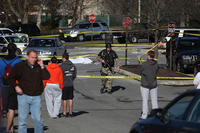-
The border fear index: How to measure border security
Both the administration and its critics rely on the FBI Uniform Crime Reports and on reported by the national media to make their arguments about how secure the U.S.-Mexican border is, and how to make it more secure; Lee Maril contends that the FBI report and the national media do not offer an accurate picture of the situation along the border because they are not nuanced enough; for example, they ignore the fear instilled in border-area residents by the cartels and the cartels’ collaborators, and they do not collect other relevant human behavior data
-
-
New technology helps Virginia Tech avoid another massacre

Last week Virginia Tech officials made all the right decisions after a man killed a campus police officer, showcasing the valuable lessons it had learned following the 2007 Virginia Tech massacre that left thirty-two people dead and twenty-five injured
-
-
Technology helps Jersey police fight crime in real-time
In the last decade massive technological breakthroughs have made information more accessible than ever before and law enforcement agencies are increasingly taking advantage of new mobile technology to help fight crime
-
-
Special kits help protect police K-9s
To help keep police canines safe while on duty, the Police & Working K-9 Foundation has teamed up with private and public companies to hold “Cover Your K-9,” an innovative series of technology and training seminars
-
-
Why law enforcement officers should earn a degree in homeland security
In a guest column, Dennis Porter, a former law enforcement officer with more than thirty years of experience, argues that it is critical for U.S. national security that members of the law enforcement community return to school to obtain degrees in homeland security; with counterterrorism becoming an increasingly more crucial duty for law enforcement officers, it is imperative that they have the skills and knowledge to effectively combat extremism
-
-
Encrypted police broadcasts sparks battle
With advances in technology it is now possible for ordinary citizens to cheaply and easily listen in on police broadcasts, which is why law enforcement agencies across the country are working to shield their communications systems
-
-
Florida’s falling crime rate has experts puzzled
With unemployment at record highs and police departments struggling with budget cuts, the fact that Florida’s crime rate has fallen nearly 33 percent in the last decade has many experts puzzled
-
-
LAPD named best counterterrorism squad
The Los Angeles Police Department’s (LAPD) Counter-Terrorism and Special Operations Bureau (CTSOB) recently received Government Security News’ highest honor for a division of its kind
-
-
DHS takes down suspected Mexican gang members in New York

On 16 November DHS agents arrested twenty-five suspected members of the Mexican Los Vagos gang on a variety of charges including murder conspiracy, assault, firearms offenses, narcotics trafficking, and immigration violations. Los Vagos allegedly used drug trafficking and violence to defend their turf from the Latin Kings, a rival gang
-
-
NYPD spying on Muslims leads to spiral of mistrust
Following the revelation that the New York City police department was spying on the daily lives of ordinary Muslims, community activists have launched a campaign encouraging people to avoid directly reporting suspicious activity to the police
-
-
Pre-crime detection scanners raise legal, scientific issues
DHS has successfully tested a pre-crime detection scanner on humans. The scanners gauge facial expressions and other biometric data to detect whether someone is giving cues for mal-intent. The DHS algorithm also includes scanning a person’s gender, ethnicity, breathing, and heart rate in a non-intrusive way through video and audio scanning. Critics want to know whether Americans agree that it is worth their safety interests to be watched in every public space, or will pre-crime scanning cross certain privacy rights?
-
-
Serving and protecting – and saving money in the process

As municipalities battle tight budgets and rising gasoline prices, law enforcement fleets across in the United States have found a way to save taxpayer dollars by shifting to clean-burning, American-made propane autogas
-
-
Surveillance plane to circle Lancaster ten hours a day

Beginning in May, a Cessna 172 airplane will hover over the Lancaster, California for ten hours a day collecting intelligence and keeping an eye on residents; the surveillance program was recently approved by city leaders in an effort to fight crime, but the prospect of aerial surveillance has critics concerned about privacy violations
-
-
Technology helps Detroit fight crime
Detroit Police Chief Ralph Godbee Jr. credits new technology and tactics for helping to reduce homicides by 15 percent
-
-
Drones and privacy
With civilian unmanned surveillance drones now capable of listening in on cell phone conversations, monitoring Wi-Fi traffic, seeing into backyards and windows not visible from the street, and tracking a person’s movement privacy advocates are concerned that the rapid advances in technology could violate privacy rights
-
More headlines
The long view
How Male Grievance Fuels Radicalization and Extremist Violence
Social extremism is evolving in reach and form. While traditional racial supremacy ideologies remain, contemporary movements are now often fueled by something more personal and emotionally resonant: male grievance.
